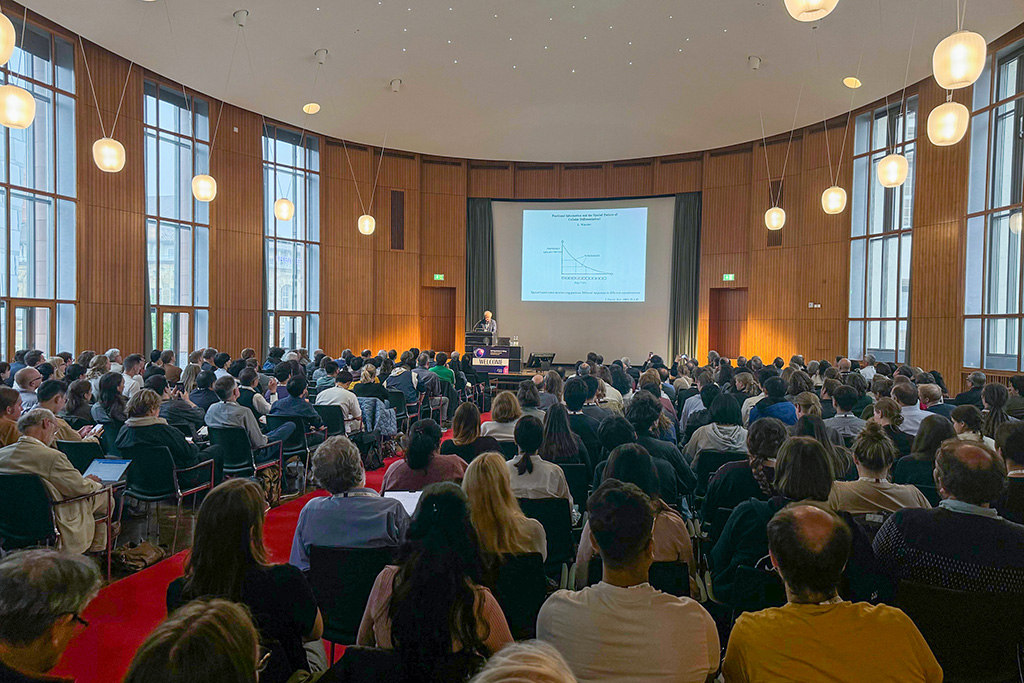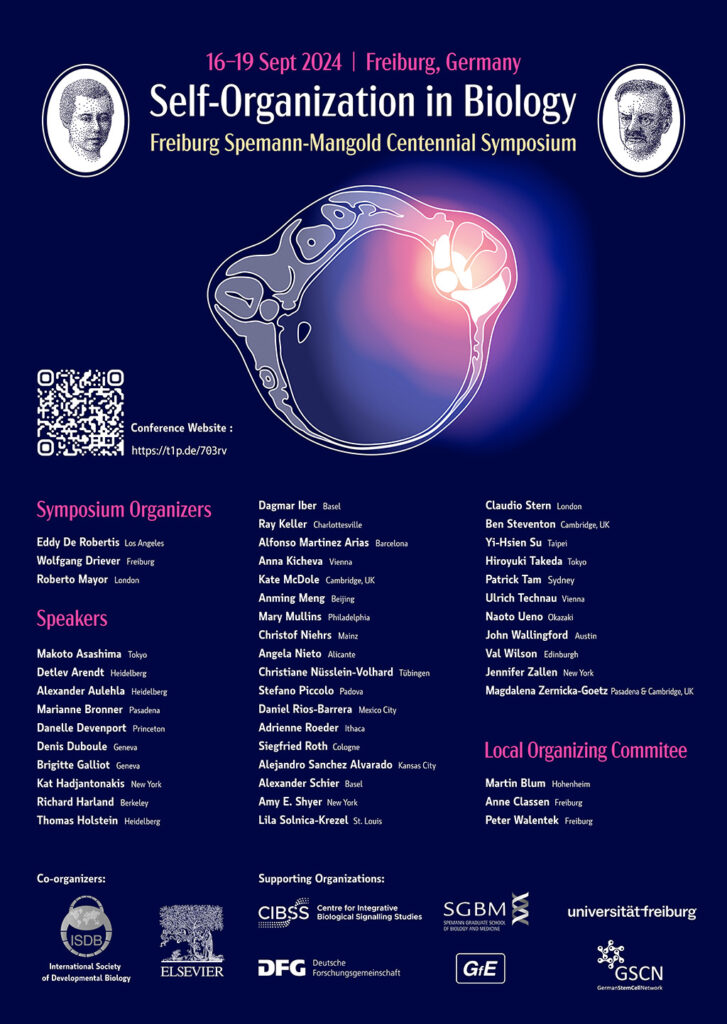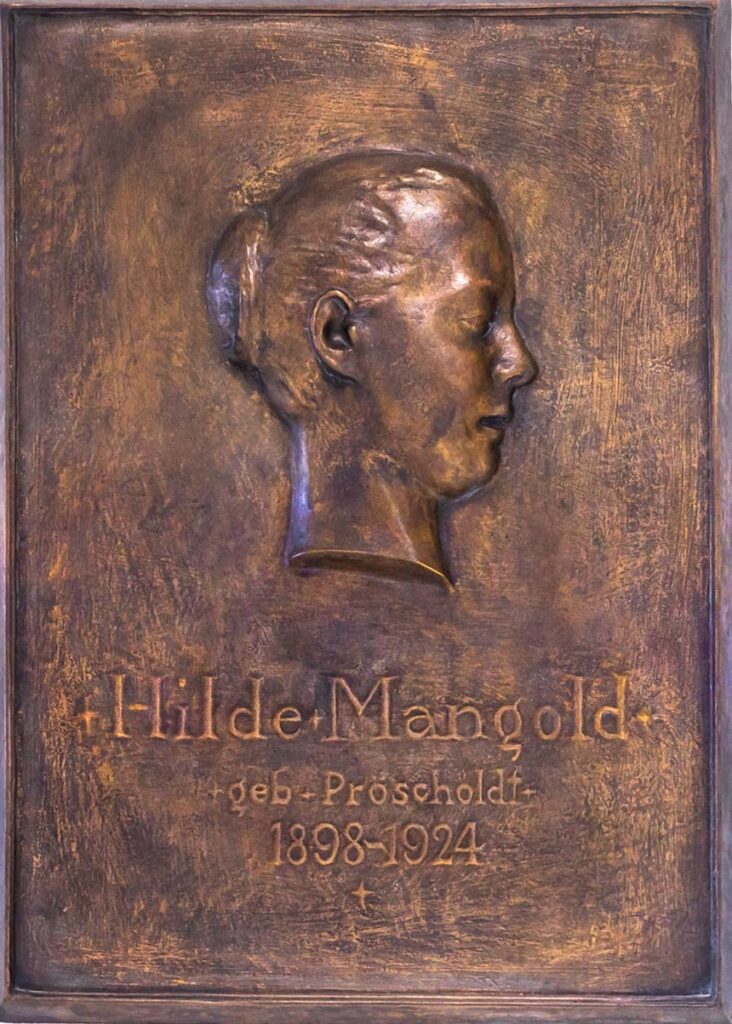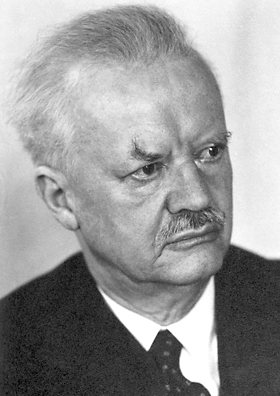Embryonic development: Discovery in Freiburg 100 years ago shapes research today
In 1924, Hans Spemann and Hilde Mangold in Freiburg made observations that contributed decisively to our current understanding of embryonic development and which were recognised with a Nobel Prize. 100 years later, an international symposium and a temporary exhibition at the Uniseum put the scientists’ work in the context of current research.

The symposium took place in the Prometheushalle where Spemann himself has given lectures. Photo: Michal Rössler/CIBSS
In the early 1920s, the Freiburg professor Hans Spemann suspected that there must be a control centre – an “organiser” – in the embryo that coordinates the early stages of development. In 1924, Hilde Mangold, a doctoral researcher in Spemann’s laboratory, succeeded in proving this hypothesis by performing experiments on newt embryos. The international conference Self-Organisation in Biology – Spemann-Mangold Centennial Symposium took the centenary of this discovery as an opportunity to discuss current research on the processes by which cells in the embryo ‘organise’ themselves into tissues and organs..

The international symposium, which took place from 16 to 19 September in Freiburg, put current research questions in developmental biology in context with the discovery of the “organiser” by Spemann and Mangold. Wolfgang Driever, spokesperson of the Freiburg Cluster of Excellence CIBSS – Centre for Integrative Biological Signalling Studies, organised the conference together with Eddy De Robertis (USA) and Roberto Mayor (UK) as well as the International Society for Developmental Biology ISDB and ELSEVIER. Nobel Laureate Christiane Nüsslein-Volhard, Stefano Piccolo and Magdalena Zernicka-Goetz were among the more than 40 experts who presented their current research.
The ‘Spemann-Mangold organiser’ refers to a group of cells that emit signalling molecules during the early stages of embryonic development. These biological signals are in turn perceived by surrounding cells in the embryo. In this way, the ‘organiser’ transmits crucial positional information that is needed to ensure that body structures develop in the right places. What makes this discovery so unique is that it is the first time such a control centre has been described. Later, especially with the advent of modern molecular biological and genetic research methods, it became clear that the transmission of spatial information via soluble signalling molecules is a fundamental and widespread mechanism in biology.


In 1935, Hans Spemann was awarded the Nobel Prize in Physiology or Medicine for his discovery of the organiser. Whether Hilde Mangold would have received the prize is controversial today: she died in an accident shortly after completing her doctoral thesis and was therefore unable to receive the prize, which is only awarded to living scientists.

“The discovery of the organiser here in Freiburg was a milestone in developmental biology and fundamental to our current understanding of how biological signals work in living tissue. Today, we are continuing Spemann and Mangold’s excellent research on signalling mechanisms.”
Prof. Dr. Wolfgang Driever
CIBSS Spokesperson, University of Freiburg
Prof. Dr. Wolfgang Driever
Professor of Developmental Biology and spokesperson of the Cluster of Excellence CIBSS – Centre for Integrative Biological Signalling Studies at the University of Freiburg
Anyone interested in Spemann’s and Mangold’s work can visit the Uniseum from 17 October: The exhibition “100 Years of Signalling Research in Freiburg: The Discovery of the Spemann-Mangold Organiser in 1924” will open there, which displays historical documents and classifies the significance of the researchers’ work for science today. Hans Spemann and Hilde Mangold are also commemorated in Freiburg in the form of the Spemannplatz square near the Lorettoberg, the Spemann Graduate School at the University of Freiburg, the Hilde-Mangold-Straße street near the University Medical Centre and the Hilde-Mangold-Haus buildingnext to the Botanical Gardens.